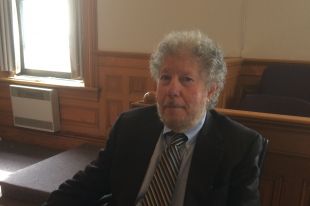Sexual Abuse to Blame for Menís Troubles: Psychologist
By Barb Sweet
Sexual abuse they suffered at Mount Cashel broke one man and created a house of cards for another, a forensic psychologist told the Mount Cashel civil trial Monday. Alan M. Goldstein of New York is the second such expert called by lawyers on behalf of four John Does who are test cases in the lawsuit against the Roman Catholic Episcopal Corp. of St. Johnís. The men represent about 60 claimants who say the Episcopal Corp. should be held liable for the physical and sexual abuse they suffered at the hands of certain members of the lay order Irish Christian Brothers during the late 1940s to early 1960s. The church says it did not oversee the orphanage. Goldsteinís testimony differs from New Mexico forensic psychologist William Foote in that by the time he got involved, there was more information for him to review. Foote evaluated three of the John Does in 2000, and Goldstein evaluated all four men in 2009 and spoke to them again this year. Goldstein was expected to speak to the cases of the two other John Does Tuesday. But Monday he told the court that a retired teacher, though one of the most articulate and intelligent people heíd evaluated, was so degraded by the abuse, particularly sexual, that he suffered at Mount Cashel, it broke him. He described the man, among other things, as having a chip on his shoulder and trouble with authority. Goldstein noted the man felt he did not deserve his successes in life. Tests had shown post traumatic stress disorder symptoms in 2009, Goldstein said, adding some symptoms have diminished over time. Goldstein also described how the manís wife told him he drank to drive a wedge between them, but confided the abuse when she came home one day and found him sobbing. This was during the televising of the Hughes Inquiry, prompted by the scandal over abuse of orphanage boys of a later era, primarily the late 1960s, í70s and í80s. That inquiry began in 1989. On the case of the John Doe who retired from the military with a low rank, Goldstein said the manís major downfall has been anger management, which was like dominoes that held back his career ó anger causing alcohol abuse, fights and inability to maintain relationships. The manís ego was completely destroyed, Goldstein said. He said the manís sister said they had a good relationship, but she noticed a change in him when he would come home from Newfoundland on leave from the military ó he would get in a ruckus due to serious drinking. She also described him as a loner. Goldstein noted his drinking has since been reined in. He had told the psychologist he drank to get demons out of his head. Up until the 1980s, when the man disclosed the abuse to a police officer, the man felt heíd been responsible for what happened to him at Mount Cashel, Goldstein said. Goldstein also noted the man never wanted to have children because, given he was sexually abused, he feared how they would turn out. Like the other two John Does, the men wound up in Mount Cashel after the death of a parent. Earlier Monday, Goldstein said the loss of a parent is unforgettable, but he said if a child ó who loses both parents or is unable to be cared for by the surviving parent ó is placed in a facility that is safe and nurturing, they can thrive. Follow @bsweettweets for live updates from the courtroom. Contact: bsweet@thetelegram.com Twitter: bsweettweets Earlier story: Another forensic psychologist called to testify in Mount Cashel trial Becoming an orphan doesn't have to mark a person for life, a forensic psychologist told the Mount Cashel civil trial in Newfoundland Supreme Court. Alan Goldstein of New York said the loss of a parent is unforgettable, but he said if a child ó who loses both parents or is unable to be cared for by the surviving parent ó is placed in a facility that is safe, they can thrive. Goldstein was called to testify ó as an expert on the impact of child sexual abuse among causes of impairment ó by lawyers for a group of former residents of the Mount Cashel orphanage during the 1940s to early '60s. They say the Roman Catholic Episcopal Corp. should be held liable for physical and sexual abuse they suffered at the hands of certain members of the lay order Christian Brothers at Mount Cashel. The church contends it did not oversee the orphanage. Goldstein evaluated all four John Does in the case years after another psychologist tested them. That psychologist, William Foote, had evaluated three of the John Does and has already testified. Goldstein began testifying on the specific cases late this morning. He recalled one man sobbing and breaking down as he talked about the abuse. Goldstein also described how the man's wife told him he drank to drive a wedge between them, but confided the abuse when she came home one day and found him sobbing. This was during the televising of the Hughes Inquiry, prompted by the scandal over abuse of orphanage boys of a later era, primarily the late 1960s, '70s and '80s. The inquiry began in 1989. Follow @bsweettweets for live updates from the courtroom. Email: bsweet@thetelegram.com
|
.
Any original material on these pages is copyright © BishopAccountability.org 2004. Reproduce freely with attribution.
